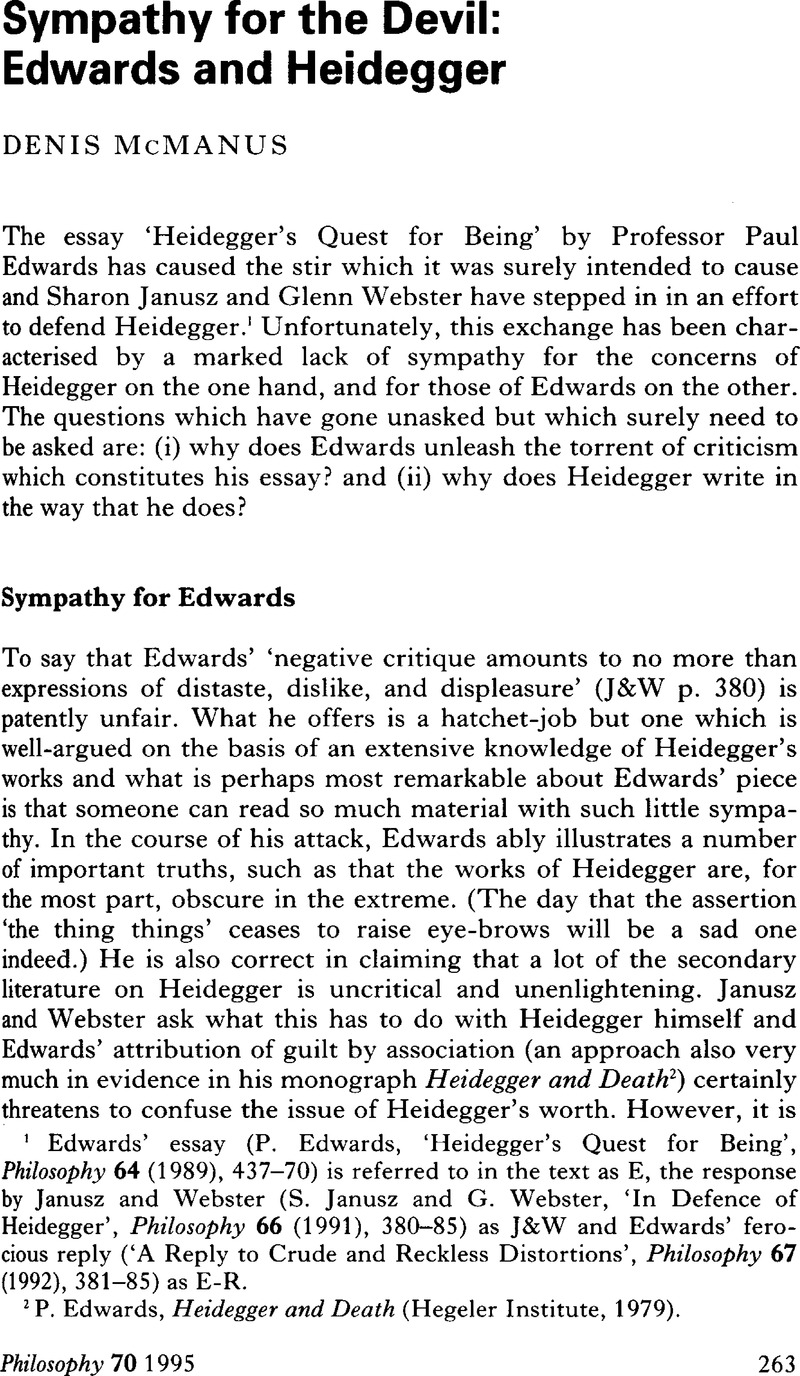No CrossRef data available.
Article contents
Sympathy for the Devil: Edwards and Heidegger
Published online by Cambridge University Press: 30 January 2009
Abstract

- Type
- Discussions
- Information
- Copyright
- Copyright © The Royal Institute of Philosophy 1995
References
1 Edwards' essay (P., Edwards, ’Heidegger's Quest for Being', Philosophy 64 (1989), 437–70)is referred to in the text as E,Google Scholar
the response by Janusz an Webster (S., Janusz and G., Webster, ’In Defence of Heidegger’, Philosophy 66 (1991), 380–85) asGoogle Scholar
J & W and Edwards' ferocious reply (‘A Reply to Crude and Reckless Distortions’, Philosophy 67 (1992), 381–85) as E-R.CrossRefGoogle Scholar
2 P., Edwards, Heidegger and Death (Hegeler Institute, 1979)Google Scholar
3 Ibid.., 37.
4 Ibid., 37, 35.
5 M., Heidegger, Being and Time, trans. Macquarrie, J. ' E., Robinson(Blackwell, 1962), 19.Google Scholar
6 Ibid. 31.
7 Exactly what Heidegger means by this term is a difficult question to answer and, in this piece, I ignore his claims regarding the historical reality of this ‘tradition’. It will be sufficient for our purposes to take ‘metaphysical thought’ as meaning a particular brand of thought which accepts, among others, the assumptions we shall be discussing.
8 M., Heidegger, The Question of Being, trans. W., Kluback and Wilde, J. T. (Twayne, 1958), 33.Google Scholar
9 M., Heidegger, ‘Letter on Humanism’, trans. Krell, D. F. in Basic Writings (Harper and Row, 1977), 242.Google Scholar
10 This is the explicit motivation offered in his early works for the rejection of terms like ‘human being’ and ‘reflective consciousness’ and the adoption of the family of terms which includes ‘Being-in-the-World’ and ‘Dasein
11 M., Heidegger, The Principle of Reason, trans. R., Lilly (Indiana, 1991), 48.Google Scholar
12 Related suspicions underlie Heidegger's attitude towards methods of formal analysis, an attitude which Edwards attributes to Heidegger's lacking the necessary ‘intellectual aptitude’ (E, 461). The results of formal analytic methods have the significance that their advocates claim they have only against a certain background, one constituted by what Heidegger would see as a number of highly contentious metaphysical theses about language. In his later work, Heidegger insists that our relationship to language is essentially non-rationalizable and that consequently there is an aspect of language which escapes formalization. For this reason, to say that the formalization of our language dissolves Heidegger's problems is to say nothing with which he would disagree.
13 The Principle of Reason, 48.Google Scholar
14 Cf., e.g., ibid., and ‘Letter on Humanism’, 239
15 Correspondingly, Heidegger's insists that ‘the opposite of the poem... is not prose’, that ‘[p]ure prose is never “prosaic”’ (M. Heidegger, ‘Language’, trans. A. Hofstadter in Poetry, Language, Thought (Harper and Row, 1971), 208).Google Scholar
16 Cf., e.g., Dreyfus, H. L.Being-in-the-World (MIT, 1991),Google Scholar
J., RichardsonExistential Epistemology (Oxford, 1986),Google Scholar
Guignon, C. B.Heidegger and the Problem of Knowledge (Hackett, 1983) andGoogle Scholar
Olafson, F. A.Heidegger and the Philosophy of Mind (Yale, 1987).CrossRefGoogle Scholar


